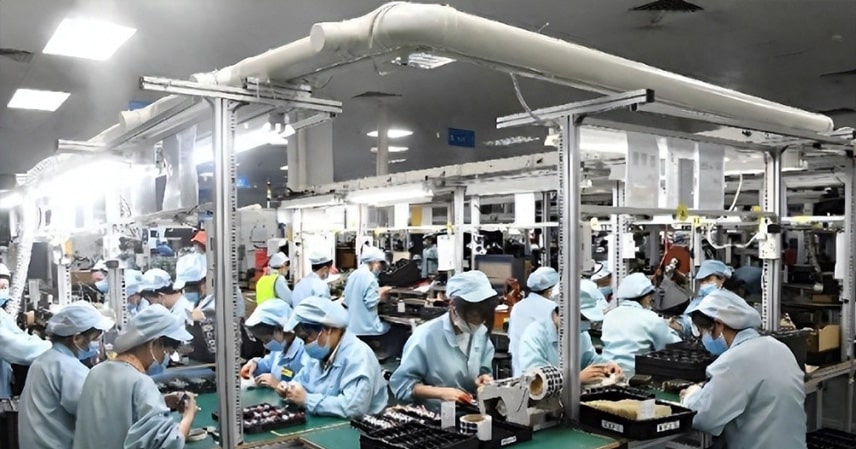Every year, over 10 million students graduate from Chinese universities, but factories—once seen as stable employers—are struggling to attract them. While some manufacturers are offering monthly salaries of 6,000 yuan or more, many young people prefer delivering food, driving ride-hailing cars, or livestreaming products online.
So why are factories becoming the least attractive option despite seemingly decent pay and benefits? What exactly are young workers avoiding, and what are they chasing?
A Collective Turn Away from Factories
In coastal industrial zones, recruitment posters are everywhere: “6,000 yuan base salary, free meals and housing, social insurance included.” Yet, few young people even show up for interviews. HR managers admit: “Even if we raise it to 7,000 yuan, they won’t come.”
China’s Ministry of Industry and Information Technology warns that by 2025, the talent gap in key manufacturing sectors will reach nearly 30 million.
But surveys tell another story: 64% of vocational school students say they will not choose factory or construction jobs. Instead, they prefer freelancing or emerging industries.
The reasons are clear:
- Working hours often stretch to 12+ hours, despite the “8-hour shift” promise.
- Overtime is underpaid and wages are often delayed by a month.
- Repetitive assembly-line work feels mechanical, offering no growth or career path.
- Strict, military-style management—timed bathroom breaks, bans on phones, drinking water under supervision—clashes with the freedom younger generations expect.
- Promotion opportunities are almost nonexistent, with long-term workers rarely rising beyond low-level supervisors.
The result: factories are seen as exhausting, rigid, and futureless.
The Allure of Freedom
If factories can’t keep workers, where are they going? The answer lies on the streets.
Jobs like food delivery, ride-hailing, and livestream sales may not be glamorous, but for young people, they offer something factories can’t: freedom and control.
- Food couriers decide how many orders to take and when to rest.
- Ride-hailing drivers can turn their app on or off at will.
- Even if the work is tough, they don’t endure bosses micromanaging their every move.
With clear, transparent pay systems—one order equals one payment—many couriers can earn over 10,000 yuan per month in major cities, often more than factory wages.
Beyond money, every day brings new faces and places, breaking the monotony of factory life, which revolves around the dormitory, workshop, and cafeteria.
Yes, the gig economy is unstable, physically demanding, and less secure long-term. But many young people are willing to trade future certainty for present dignity and autonomy.
A Clash of Values
At the heart of the issue lies a value conflict between factory owners and workers.
Many employers believe workers should obey orders quietly in exchange for a paycheck. They complain today’s youth are “spoiled” and “afraid of hardship.”
But young workers see it differently: jobs are a two-way choice, and they want respect, fair rules, and basic dignity.
This misalignment leads to high turnover and constant recruitment struggles. Some factories even deliberately maintain harsh environments, hoping to “filter out” only the toughest workers. But in the age of social media, bad reputations spread quickly, labeling them as “sweatshops.”
The result is a vicious cycle: workers quit, factories scramble to rehire, and vacancies never close.
Not All Manufacturing Is Struggling
Interestingly, not every factory is in decline. The 2023 Employment Blue Book shows that high-tech manufacturing, especially in electronics and equipment, continues to attract graduates.
Forward-thinking companies are changing their approach:
- Offering training and skills certification for career growth.
- Creating equity incentives so employees feel invested in the company’s success.
- Building a culture of respect and shared destiny between employer and employee.
These companies don’t suffer from labor shortages—in fact, they’re becoming top choices for ambitious young workers.
Conclusion
The reluctance of young Chinese to work in factories is more than a job preference—it reflects a deeper societal shift.
On one side, traditional factories cling to outdated management and rigid hierarchies. On the other, a new generation seeks freedom, respect, and personal growth.
The solution isn’t just higher wages. Factories must redefine what factory work means—transforming it from survival labor into opportunities for development and dignity.
If they don’t adapt, the talent gap will only widen. But those who respect, train, and empower workers will become magnets for talent and leaders of China’s manufacturing future.
In the end, the factories that understand young people will be the ones that thrive.
References
- Ministry of Industry and Information Technology data
- 2023 Employment Blue Book



